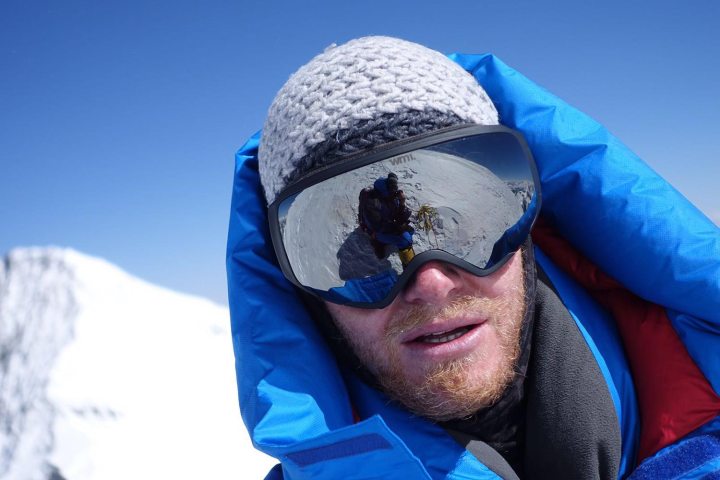
Samsung Galaxy S8 review

The Galaxy S8 is worth the hype and the wait we endured since the release of the year-old Galaxy S7 Edge (which frankly looks dated now with its home button). But in a time where you can get a fantastic smartphone for $400 or less, is it worth dropping $750 or more on the S8? We think so, if only for its brilliant screen, but it is a big ask if money is tight. The Galaxy S8 has exceptional build quality, design, and a stellar displays, not to mention plenty of power to crush any task. Let’s take a closer look.
To conquer Everest an astonishing 7th time, this climber is going high tech

Over the past nine years, professional climber and mountain guide Adrian Ballinger summitted Mount Everest, Earth’s highest mountain, six times, with two ascents coming in the span of just three weeks. Ballinger sets himself apart from the budding crowd of climbers taking to the Nepalese peak rests with his unique approach to each climb. Ballinger and climbing partner Cory Richards made headlines last year after Snapchatting their way to the summit, making use of the peak’s 3G wireless network access along the way.
Don’t dread hot, sticky summer nights — use the Bfan to stay cool in bed

We’ve been awaiting its return for months, but now that summer is nearly here, we could probably do without nights sweating into our sheets. But fret not; you can still enjoy all the perks of summer without its nocturnal drawbacks thanks to the Bfan, a bed-cooling system that will help you stay dry and sweat-free without wasting tons of energy (not to mention money). The clever solution for hot sleepers has already fared remarkably well on both Kickstarter and Indiegogo, where it raised a total of nearly $800,000.
Facebook’s newest tech will let you type with your brain and hear with your skin

Facebook has some pretty surprising ideas about the future of communication, and they extend far beyond news feeds and even augmented reality. During day two of its F8 developer conference, the social media giant announced that its Building 8 hardware lab is working on technology that will allow you to type with your thoughts and hear through your skin.
From lab-grown steaks to plant-based blood, science is taking the animal out of meat

Over the past few years, a handful of enterprising startups have sprung up with the goal of creating animal-free meat. There are several big players in this space, with some growing meat in petri dishes and others developing new and innovative ways to use plants in meat-substitute products. In this article, we’ll take you on a tour of some of the biggest players in the space, and explore the innovative ways they’re hoping to solve the carnivore’s conundrum.
Your next MasterCard may have a fingerprint sensor built into it

Most of us are used to using a fingerprint for an assortment of verification processes, from unlocking our smartphones to authenticating entry into buildings, or at passport control at the airport. Soon, you may also use your fingerprint to confirm purchases made in stores using a special MasterCard with a biometric reader built in to it. MasterCard has revealed the first card to use the technology — something it has worked on for several years — which has been undergoing tests in South Africa.
Two unconventional tools help researchers detect buried land mines

Civilians around the world are continually impacted by live land mines left over from wartime. Detecting the land mines is difficult and removing them is inherently dangerous. Every year, between 15,000 and 20,000 people are hurt or killed by the devices. As many as 110 million buried land mines have been laid in more than 70 countries since the 1960s, according to the United Nations. Millions are still buried and unexploded. Tech can help.
2017 Bentley Continental Supersports first drive

In the world of Bentley, there are two main factions. On one side, you have the classic Bentley owner: one who prefers three-piece suits, crisp newspapers, and comfort suspension settings. On the other, you have the motor sports enthusiast; the adrenaline junkie that orders an Apple Green Continental GT3-R and never takes it out of Sport mode.
AI app knows when couples are fighting, may someday predict (and prevent) conflict
Bickering isn’t abnormal, but it’s (usually) unproductive, so most people want to avoid petty fights with their partner if possible. Someday, a smartphone app may help. Researchers at the University of California (USC), Los Angeles, have used an artificial intelligence system to analyze language patterns and physiological signs in order to detect conflict in couples. The work, which the team published in the journal IEEE Computer, demonstrates the first time such monitoring has been shown to work outside of a psychology lab.
NASA has developed a futuristic 3D-printed ‘space fabric’

NASA has taken 3D printing to the next level by developing chainmail-style “4D” printed metal fabrics for use in future space missions. “We call it ‘4-D printing’ because we can print both the geometry and the function of these materials,” Raul Polit-Casillas, a systems engineer at NASA’s Jet Propulsion Laboratory who helped lead the research team, said in a press release. “If 20th-century manufacturing was driven by mass production, then this is the mass production of functions.”


